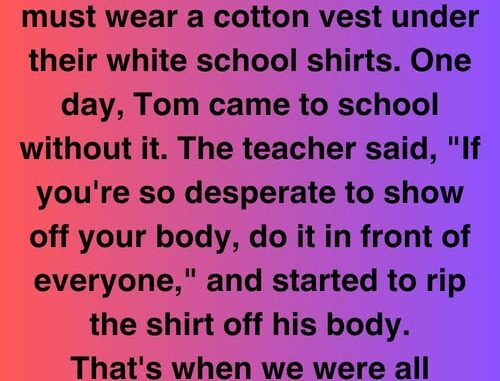
When a teacher’s mistake revealed Tom’s hidden bruises, it shook our school—but it was his courage that reshaped how we all saw him.
We were 9, in a small school in rural Maine, where uniforms included stiff collared shirts. One spring day, Tom forgot his undershirt. Our teacher, Mr. Clive, snapped, “If you’re skipping rules, stand up and show us!” He tugged at Tom’s collar, tearing it slightly.
We froze. Faint purple and green marks crisscrossed Tom’s arms, some fresh, others fading. They weren’t playground scrapes. At 9, we didn’t know everything, but we knew those bruises meant something dark.
The room went quiet. No giggles, no whispers. Tom stood, eyes fixed on the floor, face blank. Mr. Clive’s hands shook as he let go, his face pale. “I’m sorry,” he mumbled, voice cracking.
He called Mrs. Kaur, the counselor, to watch us, then guided Tom out, a gentle hand hovering near his shoulder. That moment changed us all.
Tom vanished from school for a month. Rumors swirled—kids repeating what they’d heard from parents. “His stepdad’s in trouble.” “He’s with his aunt now.” When he returned, Leena Aunty, a quiet woman from down the street, was there daily, waiting at the gate, her smile warm but eyes tired.
No one knew how to act. Tom and I had been friends since first grade, trading comic books and racing in the yard. Now, I didn’t know what to say. We all tiptoed around him.
One lunch break, I offered, “Got extra cookies—want some?” He nodded, sitting beside me on the school steps. That small gesture cracked the ice. Slowly, Jamal and Siya joined us, and Tom’s laugh returned, soft at first.
He was still Tom—obsessed with space, unbeatable at tag—but he flinched at loud voices or sudden pats. By sixth grade, he could read moods like a book, calming arguments before they flared. Teachers noticed, calling him “wise beyond his years.”
High school pulled us apart—new classes, new crowds. Tom stayed guarded, charming but distant, his smile tight when forced. Only me, Jamal, and Siya saw the real him, the one who still carried that day.
In 10th grade, Mrs. Pereira, our history teacher, started a peer support group for younger kids struggling with school or home. She asked Tom to lead it. He refused at first. “I’m not a role model,” he told me. “What if I fail them?”
Mrs. Pereira smiled. “Someone helped you, Tom. You could be that for someone else.”
He agreed. His first mentee was Naveen, a shy seventh-grader with a stutter and a knack for math. Tom never shared details, but Naveen changed—joined the math club, spoke up in class, even won a regional math prize. At a school event, Naveen’s dad shook Tom’s hand, tears in his eyes. Tom blushed, mumbling, “Just doing my part.”
Tom threw himself into mentoring, leading workshops on stress and bullying, even starting a fundraiser for a local shelter. His confidence grew, his smile real.
In our senior year, Tom was nominated for a statewide youth impact award. He was thrilled but uneasy. “Feels strange getting praise for surviving,” he said.
A week before the ceremony, his stepdad appeared at school. I hadn’t seen him since third grade—gaunt now, eyes sunken. He waited by the parking lot, calling Tom’s name.
Tom stiffened beside me, breath shallow. Mr. Clive, grayer but still teaching, stepped in. “Not here,” he said firmly, blocking the man’s path.
“I’ll handle it,” Tom said, voice low. They walked to a bench near the school’s oak tree. I stayed close, watching. His stepdad reached out; Tom pulled back. The man spoke, head bowed. Tom listened, arms crossed, face unreadable. After a nod, he walked away, leaving his stepdad slumped on the bench.
“He wanted forgiveness,” Tom told me later. “I gave it, but he doesn’t get to be part of me. That’s mine to protect.”
At the award ceremony, Tom’s speech stunned the room. “We don’t choose our scars,” he said, “but we choose what they mean. No kid should think pain is all there is.” The crowd stood, clapping, some crying.
Tom earned a scholarship to study social work in Canada. Last I heard, he runs a youth center in Halifax, helping kids through trauma. Leena Aunty visits often, Jamal built their site, and Siya sends care packages. I chip in when I can.
That day in third grade—those bruises, that silence—could’ve defined Tom. Instead, it sparked something unstoppable. I still see flashes of it: Mr. Clive’s regret, the cookies on the steps, Naveen’s prize, Tom’s steady voice.
You never know what someone’s carrying. But one kind word, one open hand, can shift their story forever.
If Tom’s journey touched you, hit ❤️ and share. Someone might need this more than you know.